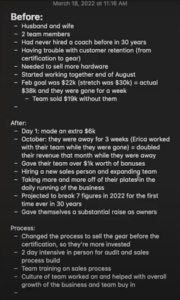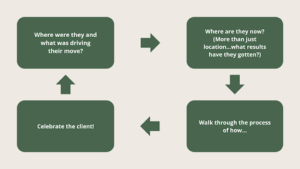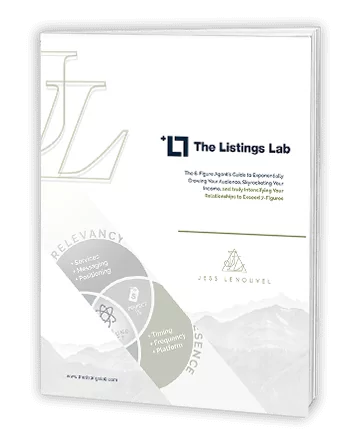Heather Hadden is one of our STAR alumni from The Listings Lab.
She started the program in December 2020 and has grown by leaps and bounds since enrolling.
Just six months after joining the program, she doubled her business.
She remembers having a crazy sales goal for 2021, and not believing it would actually happen.
Heather’s goals are so big they scare her sometimes…but she always manages to hit them!
What makes Heather one of our most successful agents to this day is her coachability but also her insanely driven attitude. She never shies away from taking action!
To give you some context of how far Heather’s come in just a short period…
The other day I was looking at a screenshot Heather sent us a couple of years back, talking about how she’d done twelve deals with her team in six months.
These days, she and her team probably do about twelve deals a MONTH.
In terms of volume, Heather does hundreds of millions a year.
Want to know *exactly* what Heather did to scale her business to multi-7 figures so quickly?

1. She Got Consistent And Omnipresent
Part of what makes Heather so successful is her consistency in marketing.
Most agents will get busy with deals and then pull back. They’ll think to themselves, “I’m too busy to keep marketing”.
Not Heather.
Heather makes sure her marketing is a top priority, no matter how busy she gets.
She shows up regularly, across all platforms. She’s omnipresent, and potential clients notice.
2. She Stepped Into Her Authority
As fun and lighthearted as Heather can be, she’s also a total boss.
At The Listings Lab HQ, we described it as Heather stepping into her queen energy.
She’s like a mother hen that a lot of people in this space look up to. She knows her stuff, and she’s not afraid to show up with confidence.
When Heather embodied her authority in her marketing, things shifted even further.
She’s not afraid to crack some jokes or show up to a Zoom call in pajamas.
AND she’s a total leader in this space.
3. She Prioritized Video Marketing
Heather notes that the reason she’s so consistent isn’t because she LOVES making videos.
It’s because she’s seen first-hand the power of video marketing for her real estate business.
A lot of the time, she isn’t in the mood to create content. But she understands that she isn’t creating video content because she’s enjoying it – she’s doing it because it gets results.
Now, creating videos is always #1 on her priority list. It’s more important than anything – than operations work, than Facebook ads, or anything else on her plate.
Embracing video marketing has taken Heather to a whole other level.
She’s constantly got clients in the pipeline because she’s always staying top of mind through her social media video content.
Since Heather prioritized videos, she’s never had to chase clients.
I talk to so many agents who are scared of this new market. Who have nothing in the pipeline.
And on the other hand, we have Heather…who tells me she has 90 people in her pipeline.
She’s got a constant influx of clients, and a majority of them are coming from her social media content.
Or, they might be people who she knows in real life, but hasn’t spoken to in years. They could be an old acquaintance she hasn’t kept up with, but because they follow her on social media, they know all about her business and have referred her to multiple people.
She’s created a marketing ecosystem that keeps her top of mind at all times and keeps her pipeline full of qualified leads.
Want to know how to do the same?
Download The Listings Lab guide here to learn how to build a marketing machine that fills your calendar with appointments.
4. She Started Showing Up Authentically
Part of what’s made Heather’s marketing so successful is she started showing up with authenticity and vulnerability.
For example, she was open about her separation and what her life looked like while she was going through that experience.
This didn’t feel natural or comfortable, but she knew she needed to show up 100% as herself in her content.
Not only does this genuineness make showing up easier, but it also creates a deeper connection with potential clients.
Just the other day, she had a client reach out, stating her courageous content as the catalyst for reaching out.
He said:
“You talked about how hard it had been [the separation], the challenge for your kids, and the depths to which you’d felt yourself fall. You also talked about how hopeful and positive you were about the future, what it meant to be a parent, and how important it all was.
It honestly was that post that impressed me the most. It takes courage to talk about that stuff, and I think it deserves recognition. Of course, you’re a professional and offer a valuable service, but I wouldn’t have been as open to it if it hadn’t been for your post about your life”.
This client not only did a deal with Heather but went on to refer her to multiple other people.
Heather confides that at first she honestly felt a bit cringe-y posting vulnerable content like this.
But when you show up as a real human being, who has struggles just like everyone else, people feel more inclined to reach out.
You become more approachable and more likable.
What’s funny is that so many real estate marketing gurus preach to do the opposite.
We’re taught to put on this “always bubbly, always doing amazing” facade.
We’re also made to believe that we have to fit into a certain mold of what a realtor is “supposed” to be.
We think we need to dress in blazers and put on a corporate persona.
But what you actually need to do is embrace what makes you, YOU.
The more Heather showed up as her true self, the more people started reaching out.
And I don’t mean the odd message every few days.
Heather gets multiple leads reaching out to her on social media every few days.
Posting regular, high-value content that showcases her authentic personality has resulted in hundreds of millions of dollars in revenue.
She constantly prioritizes being in front of the right people with relevant messaging – and it’s been the biggest game changer for her business.
5. She Set Up Systems And Delegation
Building a 7-figure real estate business isn’t just about growth.
It’s about setting up systems to be able to sustain your growth.
Together in The Listings Lab, Heather worked with us to make sure she was properly set up on the backend to handle all of the new business her marketing was now generating.
From team structure to setting up core values to defining contract policies and so much more – The Listings Lab set heather up with the foundation to build a multi-million dollar real estate business.
In Heather’s words, she says “I couldn’t have sustained that growth if I didn’t have that other stuff in place. I wouldn’t have been able to service people the way that I wanted to.”
So what does Heather’s team structure look like now, since completing the program?
On her team, Heather has:
- An assistant
- A social media and operations coordinator
- And 10 other agents
She went from a solopreneur to full-fledged real estate CEO leading a team of 12.
We couldn’t be prouder of Heather and the exponential growth she’s created in her business.
If you’d like to get results like Heather and want to fast-track your way to 7 figures, be sure to check out and apply for The Listings Lab.








